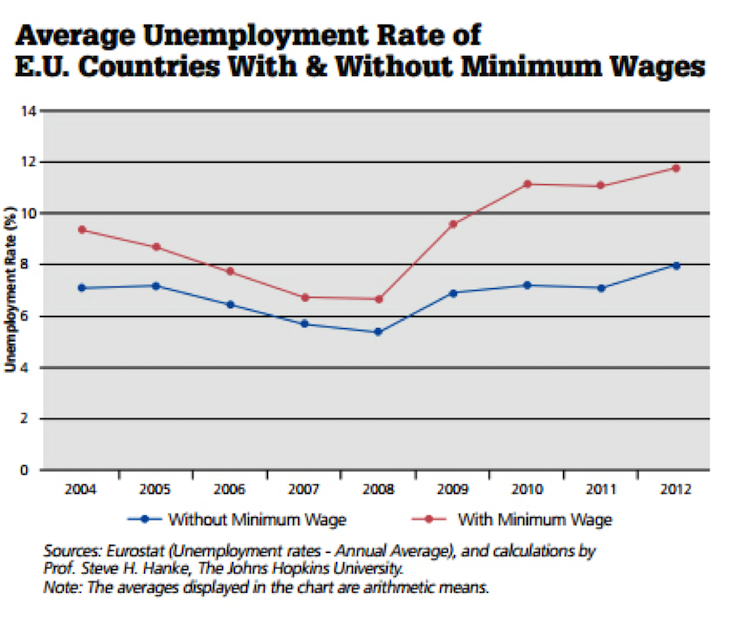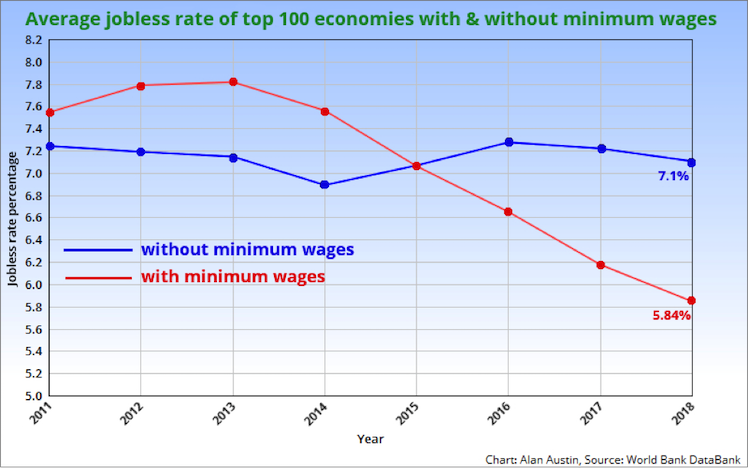If this election is a referendum on wages, as Bill Shorten claims, then the minimum wage will be an issue. Alan Austin has examined the latest World Bank data.
THE MINIMUM wage has been a divisive topic in many countries for some decades. Considerable research has found that legislated minima do not inhibit employers taking on more workers.
So it was a surprise when this chart appeared in a recent debate as a clinching argument. The red line is the average jobless rate of all 21 European Union (EU) countries which have a minimum wage. The blue line is the average jobless rate of the seven EU countries which do not. Clearly, the red line is much higher. That is, more people are out of work in the countries which have minimum wages.

That does look pretty convincing. The heading of the article, by Professor Steve Hanke of John Hopkins University, Baltimore, USA, is emphatic: “Let the Data Speak: The Truth Behind Minimum Wage Laws”.
Hanke insisted the “truth” of minimum wage laws in general, and those enacted by former US President Barrack Obama in particular, is this:
“So, minimum wage laws — while advertised under the banner of social justice — do not live up to the claims made by those who tout them. They do not lift low wage earners to a so-called ‘social minimum’. Indeed, minimum wage laws — imposed at the levels employed in Europe — push a considerable number of people into unemployment.”
The graph ends at 2012, however, so we decided to update it through to 2019. Then, if all is at it appears, we must revise our views and accept that minimum wages do not help the poorest workers.
Then a curious thing happened. In 2015, Germany implemented a minimum wage and thus moved from the small group “without” to the larger group “with”. This alone immediately reversed the ranking of Hanke’s blue and red lines. Why? Because Germany has the lowest jobless rate of all EU countries, just 3.1 per cent at last report. So shifting just this one outlier to the minimum wage camp immediately changed the professor’s results from 2015 onwards.
Taking a closer look at the two groups, another intriguing fact emerged. The outlier at the opposite extreme was Greece, with 18.5 per cent jobless in January. If we decided simply to eliminate this one country from the calculations – because it is clearly distorting the picture – then again, right from the beginning of Hanke’s results range, the two lines – the blue and the red – have their order reversed.
These observations revealed the fundamental problem with Hanke’s methodology. The group of seven countries without minimum wages – now down to six – is too small and too liable to distortion by outliers.
Surely, with 238 economies listed in the CIA Factbook, there must be better datasets than six versus 22 just in Europe. And, of course, there are.
A more reliable comparison is within the top 100 economies in the world by total gross domestic product. That is, the 100 biggest economies. Of these, fifty had a minimum wage in place eight years ago and fifty had none. Exactly half and half. Today, 58 have a minimum wage and 42 have none. This is because Hong Kong introduced a minimum wage in 2011, Indonesia and Serbia in 2012, Malaysia in 2013, Bangladesh in 2014, Germany and Myanmar in 2015 and Sri Lanka in 2016.
So we can calculate the average jobless rate for all countries with and without a minimum in place for each of the last eight years, ensuring countries which changed camps are included in the correct category.
The most complete chart showing jobless rates over time is found at the World Bank. It is current to 2018, and lacks only Taiwan whose data we find at Trading Economics.
The outcomes are quite convincing – but in the opposite direction to Hanke’s findings with his small database. In 2018, the average jobless rate for all 58 countries with a minimum wage was 5.84 per cent. The average rate for all 42 countries without one was 7.10 per cent. That is a substantial difference.
Graphed over time, we see a change in the order of the two groups from 2015 onwards. So this data does, in fact, support Hanke’s findings for the period prior to 2015. But for the current period of robust recovery from the global financial crisis, the data clearly shows workers are winners in countries with a minimum wage.

We can check this outcome using the latest data assembled by Trading Economics, which uses slightly different employment measures, and is current for most countries up to early 2019. We find the contrast here even more stark. The average jobless rate for all 42 countries which do not have a minimum wage is 9.56 per cent. The average jobless rate for all 58 countries which do have a minimum wage is 6.26 per cent. That is an even greater difference.
These findings were emailed to Professor Hanke at Hopkins University two weeks ago. He was asked “Have you updated your findings since 2014?” and “What is your current understanding of the impact of minimum wages on employment rates?”
No reply yet. If there is, it will be posted in the comments section at the end of this article.
In his budget reply speech this month, Opposition leader Bill Shorten asserted that “the next election will be a referendum on wages.”
If so, ensuing challenges include exploring the optimum minimum level. How low is too low and how high is too high? Should this be a living wage, as trade unions have been urging for years and as Labor now proposes? Is this the critical issue facing the incoming government, as 124 academics have recently claimed?
And, of course, the vital question: which party is most likely to deliver the best outcomes for workers, and for all citizens, in coming years?
——————–

Alan Austin
Alan Austin is a freelance journalist with interests in news media, religious affairs and economic and social issues.
You can follow Alan on Twitter @alanaustin001 .
Coalition doubles all government debt since Federation in just under six years
Public support is vital so this website can continue to fund investigations and publish stories which speak truth to power. Please subscribe for the free newsletter, share stories on social media and, if you can afford it, tip in $5 a month.
Alan Austin is a freelance journalist with interests in news media, religious affairs and economic and social issues.

